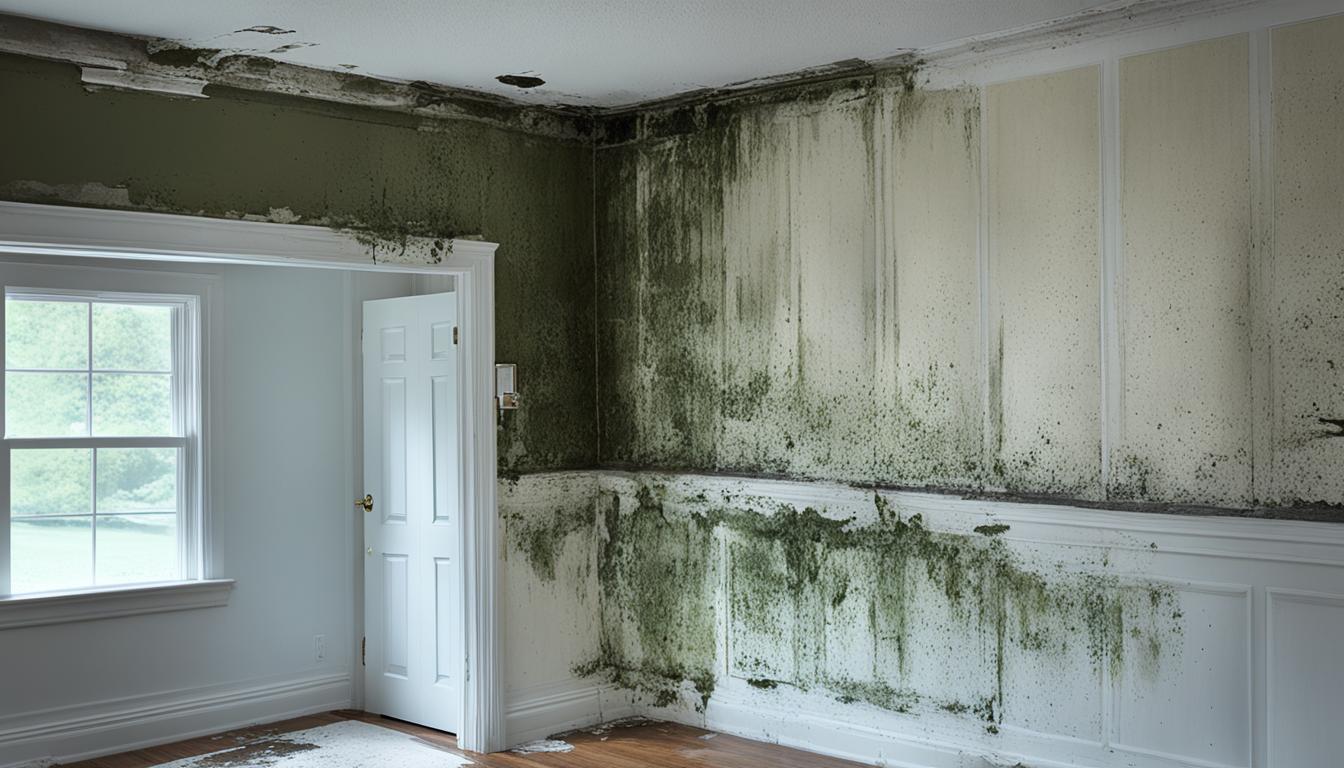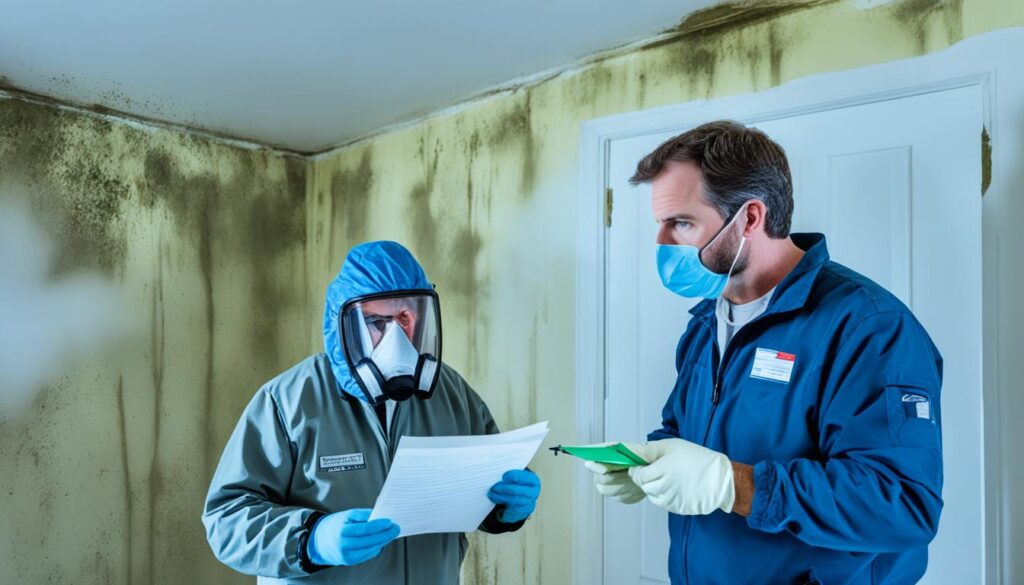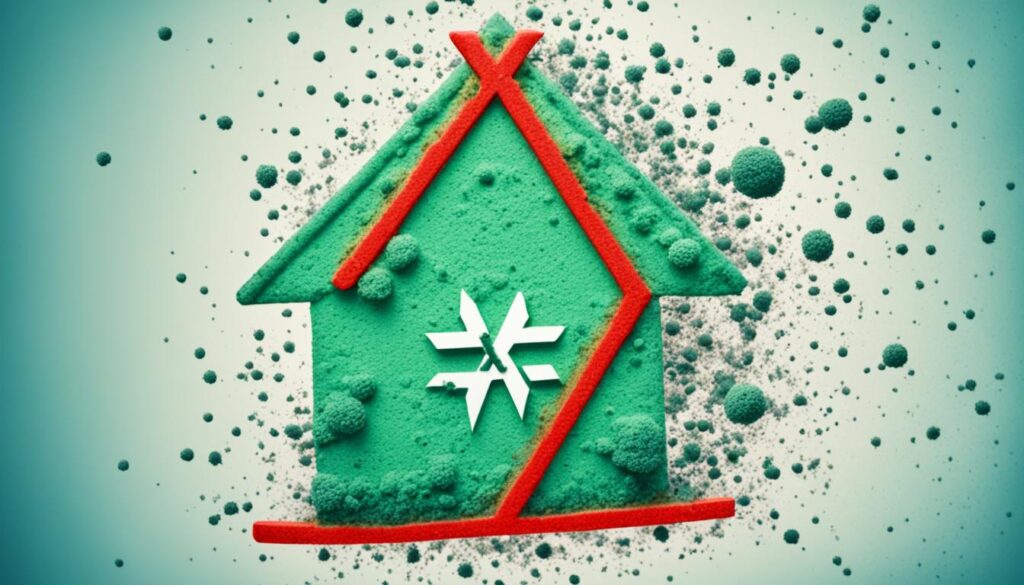
Impact of Mold on Florida Home Insurance Rates
When it comes to protecting your home, having the right insurance coverage is crucial. In Florida, where humidity and moisture levels are high, homeowners face a unique challenge – mold damage. Mold not only poses health risks but can also wreak havoc on your property, leading to costly repairs and insurance claims.
In this article, we will explore the impact of mold on Florida home insurance rates and how it can affect your property insurance policies. We will delve into the coverage for mold damage provided by insurance policies in the state and explain the process of filing insurance claims for mold remediation. By understanding these factors, you can make informed decisions to protect your home and manage your insurance costs effectively.
Key Takeaways:
- Mold damage can have a significant impact on home insurance rates in Florida.
- Understanding the coverage options for mold damage is essential to ensure adequate protection.
- Filing insurance claims for mold remediation can be a complex process.
- Preventive measures and regular mold inspections can help mitigate the risk of mold-related property damage.
- Being aware of the specific mold-related provisions in your insurance policy is crucial.
The Effects of Mold on Home Insurance Premiums in Florida
When it comes to home insurance premiums in Florida, the presence of mold can have significant implications. Mold damage can be costly to repair, making it a concern for both homeowners and insurance providers. In this section, we will explore how mold can affect home insurance rates and the coverage options available to protect against mold-related expenses.
The Importance of Mold Inspections for Insurance Purposes
Before diving into the effects of mold on home insurance premiums, it’s essential to understand the role of mold inspections in the insurance industry. Mold inspections for insurance purposes play a crucial role in assessing the risk and potential costs associated with mold damage. Insurers may require policyholders to conduct regular mold inspections to ensure proactive measures are taken to prevent mold growth and mitigate potential claims.
By conducting mold inspections, homeowners can identify and address mold issues early on, minimizing the risk of extensive damage and costly insurance claims.
Mold Mitigation and Insurance Coverage
Insurance policies in Florida differ in their coverage for mold mitigation. It’s important for homeowners to review their policy carefully to understand the extent of coverage provided for mold-related expenses. Some policies may include mold remediation as part of their standard coverage, while others may offer it as an optional add-on or exclude it altogether.
Homeowners should consider opting for comprehensive coverage that includes mold mitigation to protect their property from potential damage and ensure financial security in the face of mold-related issues.
The Impact of Mold Claims on Property Insurance Rates
When homeowners file mold-related insurance claims, it can have an impact on their property insurance rates. Insurance providers assess the risk associated with mold claims when determining the premiums for policyholders. Multiple claims or a history of mold-related issues may result in higher insurance rates or even policy cancellations.
It’s crucial for homeowners to weigh the potential financial benefits against the long-term impact on insurance rates before filing mold-related claims. Seeking professional advice and guidance from mold experts can help homeowners make informed decisions about insurance claims and mitigate any negative effects on property insurance rates.

In the next section, we will focus on strategies for mitigating the impact of mold on property insurance rates. We will discuss the mold exclusions that may be present in insurance policies in Florida and provide tips for preventing mold-related property damage. Stay tuned for expert advice on navigating the insurance claims process in the event of mold-related issues.
Mitigating the Impact of Mold on Property Insurance Rates
When it comes to property insurance rates in Florida, the presence of mold can have a significant impact. To minimize the negative effects and ensure adequate coverage, homeowners need to be aware of mold exclusions in their insurance policies and take proactive measures to prevent mold-related property damage. Additionally, understanding the insurance claims process in the event of mold-related property damage is crucial for homeowners.
Understanding Mold Exclusions in Florida Insurance Policies
Insurance policies in Florida may have specific mold exclusions, which limit or exclude coverage for mold-related damages. These exclusions are typically outlined in the policy’s terms and conditions. It is essential for homeowners to carefully review their policies and understand the extent of coverage provided for mold damage. By doing so, they can assess whether additional coverage or endorsements are necessary to adequately protect their property.

Preventing Mold-Related Property Damage
Prevention is key when it comes to mold-related property damage. By taking proactive measures, homeowners can mitigate the risk and potential costs associated with mold. Here are some tips to prevent mold growth:
- Ensure proper ventilation in high-humidity areas like bathrooms, kitchens, and basements.
- Keep indoor humidity levels below 60% by using dehumidifiers or air conditioners.
- Fix any leaks or water damage promptly.
- Regularly inspect and maintain your property’s plumbing, roof, and gutters.
- Monitor indoor humidity levels and address any signs of condensation or moisture buildup.
Navigating the Insurance Claims Process for Mold-Related Property Damage
In the unfortunate event of mold-related property damage, homeowners need to navigate the insurance claims process effectively. Here are some key steps to follow:
- Document the damage by taking photos or videos as evidence.
- Report the claim to your insurance provider as soon as possible.
- Provide all necessary documentation, including receipts for any mold remediation or repairs.
- Work closely with your insurance adjuster to ensure a smooth and fair claims process.
- Consider seeking professional assistance, such as a public adjuster, for expert guidance during the claims process.
By understanding mold exclusions, taking preventive measures, and being prepared for the claims process, homeowners can mitigate the impact of mold on their property insurance rates in Florida.
| Benefits of Mitigating Mold | Risks of Ignoring Mold |
|---|---|
|
|
Conclusion
In conclusion, the presence of mold can have a significant impact on property insurance rates for homeowners in Florida. Mold damage insurance coverage varies depending on the specific policies offered by insurance providers in the state. It is crucial for homeowners to thoroughly understand their insurance policy’s provisions concerning mold. Being aware of the coverage options available will allow homeowners to make informed decisions about protecting their homes from mold-related damage.
Preventive measures play a vital role in minimizing the negative effects of mold on property insurance rates. Taking proactive steps to prevent mold growth and damage can help homeowners maintain favorable insurance rates and reduce the risk of mold-related property damage. Regular inspections for mold and prompt mitigation of any discovered issues are key to ensuring the long-term health and integrity of a home.
In the event of mold-related property damage, homeowners should be prepared to navigate the insurance claims process effectively. Understanding the claims process and knowing what documentation is needed can help homeowners file successful insurance claims for mold remediation. By promptly reporting and documenting mold damage, homeowners can seek adequate compensation from their insurance providers to cover the necessary repairs or remediation.
If you require professional assistance with mold assessments, prevention, or remediation, contact Fix Mold Miami at 305-465-6653. Their experienced team can help you navigate the complexities of mold-related issues and provide expert guidance in protecting your home and managing insurance claims.




